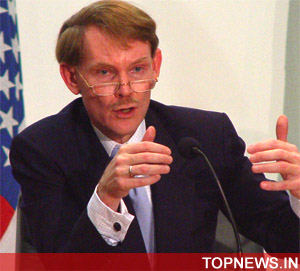Joining Russia could help ease financial crisis, says Zoellick
 Berlin - The global financial crisis could present the international community with the chance to lay aside the recent tensions that have emerged with Russia, World Bank chief Robert Zoellick said in a speech delivered in Berlin Wednesday.
Berlin - The global financial crisis could present the international community with the chance to lay aside the recent tensions that have emerged with Russia, World Bank chief Robert Zoellick said in a speech delivered in Berlin Wednesday.
"Relations with Russia have been strained in recent years," Zoellick told an audience at Berlin's Humboldt University.
"Today's financial crisis could be an opportunity to develop sounder economic relations that might be a foundation, with Russia's help, to build co-operation in solving common problems," said Zoellick.
Delivering the first Willy Brandt lecture, the World Bank chief also stepped up his call for the international community to take action to recognize the growing economic power of the world's leading emerging economies such as Russia and China.
In a sense, Zoellick's remarks echoed comments made over the weekend by Russian President Dmitry Medvedev who said working together with the US to resolve the economic crisis was an opportunity for the two countries to rebuild relations.
This in particular follows the tensions unleashed between Washington and Moscow over US plans to deploy missiles in Central Europe and the conflict in Georgia.
"The financial crisis is the common enemy of the US and Russia," Medvedev told a gathering at the Council on Foreign Relations think tank in Washington after attending the summit of Group of 20 (G20) leaders in the US capital.
The G20 took a major step at its summit in Washington towards boosting the role of emerging economies in key global forums such as the International Monetary Fund and paving the way for regular meetings of G20 leaders.
In his speech in Berlin, Zoellick also stressed again how inadequate forums such as the Group of Seven leading industrial nations were in facing up to the changes underway in the world economy.
"As the financial crisis has shown, we need more than the Group of Seven to address today's 21st century problems," he said.
"Rising economic powers such as China, India and Russia must be part of the solution," he told his audience.
"We now need reinvented global frameworks to reach our potential, to weather storms of economic changes or climate security," he said.
Delivering his speech, Zoellick paid tribute to Brandt's vision in international affairs and his efforts as German Chancellor between 1969 and 1974 to end Germany's Cold War divide.
In addition to stressing the importance of Germany's ties with western democracies, Zoellick said Brandt "was alert to the sensitivities of Germany's smaller eastern states."
With this in mind, Zoellick called on Berlin to play an active role in helping the new democracies in Central Europe that emerged from the collapse of communism nearly 20 years to find their way through the current financial crisis.
"Now some of Germany's newer European Union neighbours face financial and economic dangers," the World Bank chief said. "They are caught up in an economic whirlwind.
"I hope Germany will work with other EU members to be supportive of those neighbours," said Zoellick.
Germany's post-Second World War economic transformation helped to lay the foundations for the nation to emerge as Europe's biggest economy.
But the World Bank President reminded his audience: "You know better than others how economic travails can spark political embers, flaming into social conflagrations."
The German and European horizon should also be extended to the challenges taking shape in Ukraine, Moldova and the Caucasus, Zoellick said.
"Joining with its European partners and multilateral institutions, Germany can help these countries withstand today's financial and economic storms," said Zoellick. (dpa)